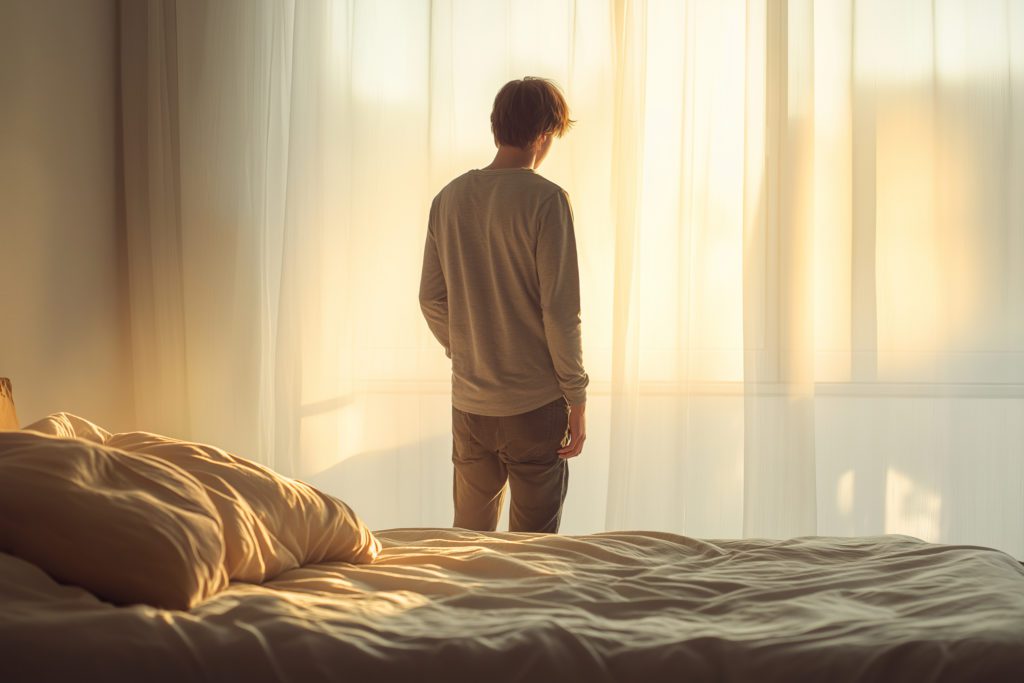
Can Lack of Sleep Cause Headaches?
Discover how poor sleep can cause headaches, the connection between sleep and migraines, and practical tips to prevent and manage these issues effectively.

You’ve just woken up after a poor night’s rest, and yet again, you have another headache. You might wonder, was it really my poor night’s rest, or is it something else contributing to my migraine?
Unfortunately, that dull ache or pressure you feel after getting poor sleep isn’t due to some other mysterious factor but your lack of sleep or interrupted sleep. If you experience this regularly, you’re certainly not alone! However, it’s important that you understand why lack of sleep causes headaches, as well as how you can prevent this in the future.
This article will explore how sleep and headaches are linked and why you get headaches after poor rest. Additionally, we’ll also look into the physiology behind this and why this happens, as well as how you can prevent this from happening in the future. If you’re ready to learn, read on!
The Connection Between Headaches and Sleep
Before we get to the ultimate answer to our question, we have to understand why headaches and sleep are connected. Sleep is one of the most essential activities that our bodies experience—even when we aren’t conscious! Our nightly rest is important for us to recover, grow and repair muscle, consolidate memories, and process our emotions. But more so than that, sleep and headaches have a unique interdependent relationship (Source: PubMed).
What this means is that sleep depends on headaches to indicate their quality overnight, but how we sleep can also impact our potential to get a headache or migraine. In other words, let’s say that you slept poorly the night before or too much. Either way, you’re more likely to wake up with a headache because of how you rested. On the other hand, if you struggled with a migraine and then went to bed, you’re more likely to struggle to get adequate rest. So, as you can see, both sleep and headaches are deeply connected.
How and Why Does a Lack of Sleep Lead to Headaches?
We’ve unveiled the interdependent relationship sleep and headaches have to one another, but how and why do we experience headaches after we lose out on sleep? To understand this, we have to look at the physiology behind our sleep and what losing sleep does to us. When we don’t get enough rest, our bodies will feel it. We get more inflammation due to overactivity or underactivity in our neurotransmitters. We’ll also feel groggy and might even struggle with sleep inertia, which can be annoying.
If you ever lose one to three hours of sleep per night, you could end up with a headache for at least one hour the next day. Some people argue that this is because of sleep inertia, which is when your body wants to return to sleep to finish its sleep cycle (Source: PubMed). Even worse, if it is sleep inertia and it’s caused by you waking up in the midst of deep sleep, the effects might last up to four hours! That means you’ll experience grogginess, headaches, and more for the first four hours of your day.
In essence, losing sleep in any capacity leads to headaches because your body is pulled out of sleep before it’s ready or has had enough rest. In doing this, your body has to transition to wakefulness, which is why you experience sleep inertia and get headaches and uncomfortable aches at times. You might even experience muscle tension and more stress or anxiety, which, all in all, will make you want to crawl back into bed.
How to Prevent and Manage Headaches Through Better Sleep
As you might have guessed, the easiest way to defeat the migraines, tension headaches, and cluster headaches you might face as a result of poor sleep is to get better rest. If you’re stuck on how to ensure proper rest and recovery at night, there are a few methods you could try that are practical, proven, and healthy for your overall well-being:
- Adhere to a Regular Sleep Schedule: The best way to ensure you don’t fail to get enough sleep is to prepare in advance. That means setting a sleep schedule and sticking to it so that you get the recommended seven to nine hours of sleep every single night that you need to function and stay healthy.
- Protect Your Sleep Environment: Even with the right schedule, your environment could just be the wrong fit for rest. Your bedroom should be cool, cozy, and distraction-free. That means using blackout curtains if you need white noise machines and getting comfy bedding that you’ll want to wrap yourself up in.
- Practice Meditation and Mindfulness: If you struggle with anxiety or stress, one of the best ways to wind down to get restful sleep is to meditate and practice mindfulness. Studies have shown that a simple mindfulness meditation before bed could help with encouraging less sleep disturbances and more rest (Source: PubMed).
- Progressive Muscle Relaxation: For those who get tension headaches due to tight muscles or soreness, progressive muscle relaxation exercises can definitely help! Experts have found that patients with chronic tension headaches were able to reduce their pain and improve their sleep quality over time through this exercise (Source: PubMed).
- Consult a Specialist: If all else fails or you are interested in pharmaceutical interventions, reaching out to your primary care provider or even a sleep specialist is an excellent idea. They can evaluate you, see if there is something deeper happening with your headaches, and if there is a medication that could support your efforts to get better rest.
Eliminate Headaches Upon Waking by Preventing Poor Quality Rest
We hope that you learned something new in this article! With so many challenges to getting rest, the best thing you can do is to take preventative steps to protect your sleep health. If you find yourself still struggling with headaches, it is not a bad idea to reach out to a specialist for more insights. Chances are, they can provide you with the insights you need to finally feel your best and wake up rested and headache-free every morning.
FAQ
Can napping during the day help alleviate headaches caused by poor sleep?
Short naps (20–30 minutes) can be helpful if you're experiencing a headache due to sleep deprivation. Napping can provide a quick reset for your brain, reducing fatigue and helping to relax tension that might contribute to headaches. However, long naps or late-afternoon naps can disrupt nighttime sleep, potentially worsening the problem in the long term.
Is there a connection between hydration, sleep, and headaches?
Yes, hydration plays a critical role in sleep and headache prevention. Dehydration is a common trigger for headaches, and it can also make falling and staying asleep more difficult. Drinking enough water during the day ensures your body is properly hydrated, which can reduce the likelihood of both headaches and poor sleep.
Are certain foods linked to headaches and sleep disturbances?
Do hormonal changes related to sleep affect headaches?
Hormonal fluctuations, particularly in women, can influence both sleep and headaches. For instance, changes in estrogen levels during the menstrual cycle can impact sleep quality and trigger migraines. Managing sleep consistency during these times can help minimize headache severity.
Are there natural remedies to improve sleep and prevent headaches?
Several natural remedies may help improve sleep and prevent headaches. Techniques such as aromatherapy with lavender oil, practicing mindfulness meditation, or using a weighted blanket can promote relaxation and better sleep quality. These strategies may help reduce stress-related headaches without medication.

Written by
Marie Soukup
Marie Soukup is a seasoned copywriter, editor, and Integrative Nutrition Health Coach with a certificate from the Institute of Integrative Nutrition (IIN). With years of experience working with brands across diverse industries, Marie is passionate about holistic health and crafting compelling content.
Download Pillow
Get help
Press & News
Legal
Connect
X (Twitter)
Company
Copyright © Neybox Digital Ltd.



